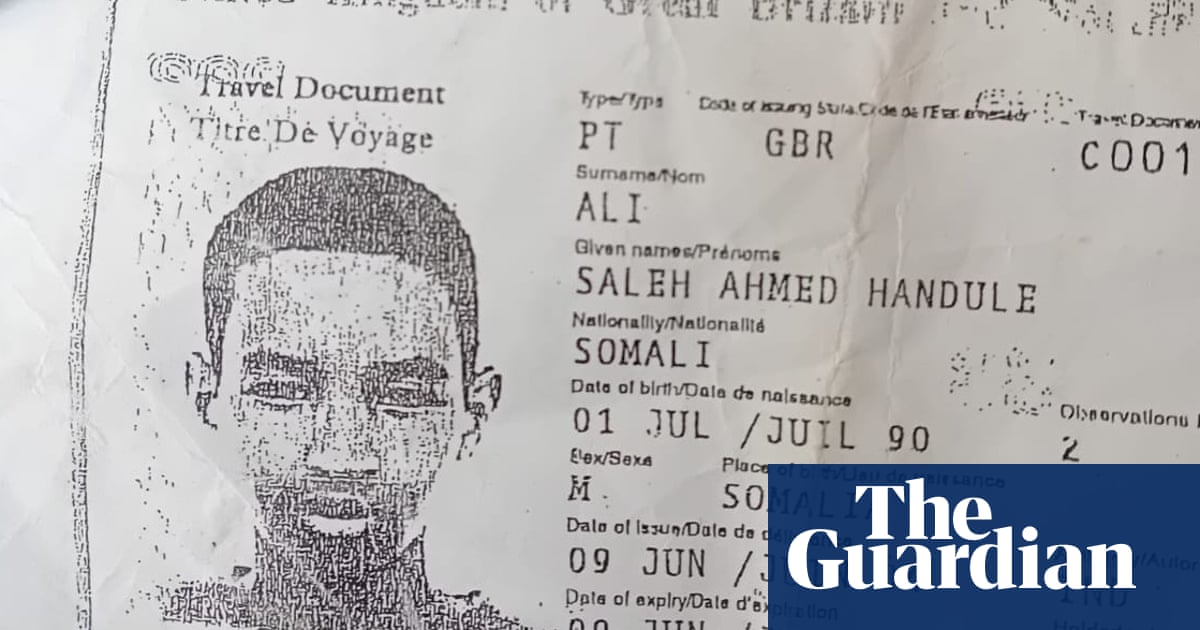Refugee who left UK for holiday in 2008 stranded in east Africa for 16 years

A refugee who left the UK on holiday as a teenager in 2008 has been stranded in east Africa for the last 16 years in a case that senior judges have described as “extraordinary”.
Saleh Ahmed Handule Ali, now 33, arrived in the UK at the age of nine in April 2000 with his mother and two younger siblings from Somalia. They came to join Ali’s father, who had been granted refugee status by the UK government. The family were also recognised as refugees by the Home Office and Ali was given a travel document in 2004 under the refugee convention, which was valid for 10 years.
In 2008 Ali was diagnosed with tuberculosis and in December of that year decided to travel to Djibouti for a short holiday in the hope that the warmer climate would aid his recovery.
At some point after arriving in Djibouti, he lost his refugee travel document and could not get back home to his family, who live in Bristol. As there is no British embassy in Djibouti, he managed to get to neighbouring Ethiopia, and when he finally reached Addis Ababa, he tried at least twice to get assistance from the embassy, without success.
It later emerged that the Home Office had failed to keep a record on its database of the fact that it had granted him indefinite leave to remain in the UK as a refugee. According to a ruling in the court of appeal last week, he has been “stranded in Ethiopia, undocumented, ever since”.
His mother, who suffers from several health conditions, saved up money for several years to engage a solicitor to try to bring her son back home.
In June 2015, a Home Office entry clearance officer refused Ali permission to return to the UK. The family appealed the first tier and in the upper tribunal of the immigration court, but their appeals were rejected.
Ali is undocumented in Ethiopia and is living a hand-to-mouth, destitute existence, unable to work. He survives on the money his mother sends him.
“I have been crying for 16 years over the loss of my son,” his mother, Shamis Dirya, told the Guardian. “We want the Home Office to bring him back to us. But they are not listening to us. When we speak on the phone, I cry and he cries. He has not had a phone for the last three months, so it has been difficult to speak to him. Sometimes we don’t even know whether he’s alive. He went to primary school here, he went to high school here. He only went to Djibouti for a short holiday.”
In the court of appeal, the lead judge, Lady Justice Andrews, said in the ruling by three judges: “This is by any standards and in many different respects a most extraordinary case.”
after newsletter promotion
The judgment, which granted Ali’s appeal against the refusal of his case and remitted it to the upper tribunal, was critical of the judge in the first-tier tribunal, Adam Rhys-Davies, and said that a clear error of law had been made when he rejected Ali’s case.
Referring to information coming to light in 2017 that the Home Office had no information on its system recording that Ali had been granted indefinite leave to remain in the UK, the judgment said: “Quite how this could have happened … is difficult to comprehend.”
Khalid Khashy of Pristine Law, who represents Ali, said: “Our client understandably has suffered immensely, including from mental health and destitution, whilst living in African countries of Djbouti and Ethiopia in the hope of returning to his home and family in the UK.
“Unfortunately, his ordeal is not over, as the matter is sent back to the upper tribunal for a fresh decision, which could take months. To avoid costs and delays, it is hoped that the Home Office will concede and grant him entry clearance with a sincere apology.”
A Home Office spokesperson said: “It is a matter of longstanding government policy that we do not routinely comment on individual cases.”
Related
Calls for over 60 free bus travel update from Department…
Calls for free bus travel for those over the age of 60 in England is gaining more attention after an increase of support. Unlike those in Wales, Scotland, and N
Major UK train station is one of the worst places…
Pickpockets are a problem across the UK, but one place is the worst for having your belongings stolen. According to the British Transport Police (BTP), just und
UK Snow Travel Chaos: Kent, East Sussex, West Sussex, Hampshire,…
UK Snow Travel Chaos: Kent, East Sussex, West Sussex, Hampshire, Wiltshire, Surrey, Berkshire, Greater London, Essex, Suffolk, Hertfordshire,
‘Only travel if necessary’ warning as UK’s busiest motorway shut…
NATIONAL Highways have issued an urgent warning to drivers as one the UK's biggest motorways shuts for the weekend. They has urged drivers to re-plan their rou











